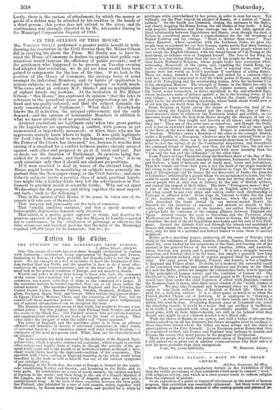"IN THE OPINION OF THIS HOUSE."
Mn. VINCENT SCULLY performed a greater public benefit in with- drawing his resolution on the Civil Service than Mr. Milner Gibson did in carrying his about the Press. Mr. Scully was to have in- vited the House of Commons to declare its opinion that public exa- minations would increase the efficiency of public servants ; and if the gentlemen who happened to be present on Tuesday evening had adopted that resolution, we do not see what would have been gained to compensate for the loss of the time. If we look to the position of the House of Commons, the average force of mind amongst its individual Members, and its habits of application to serious subjects, we shall not regard its " opinion " as worth much. Who cares what an ordinary M.P. thinks ? and no multiplication of ciphers breeds any indease. At the invitation of Mr. Milner Gibson, "this House" has expressed its opinion "that the laws in reference to the periodical press and newspaper-stamp are ill de- fined and unequally enforced, and that the subject demands the early consideration of Parliament." What then ? Everbybody knows the ill definition, the unequal enforcement, and the early demand ; and the opinion of honourable Members in addition to what we know already is of no practical value.
Abstract resolutions are legitimate only when two great parties in the Legislature are approaching a conflict, with powers as yet unmeasured or imperfectly measured ; or when those who are the aggressors scarcely know where to begin. It was quite legitimate for Lord John Townshend to move his famous resolution, "That the Power of the Crown has increased," &c., because it was the first raising of a standard for a conflict between parties already arrayed against each other and prepared to go at it tooth and nail. But as deeds are the function of Parliament, its opinions being fur- nished for it ready-made, and itself only passing "acts," it is on such occasions only that it should use abstract propositions.
If it were resolved to deal in wares of the abstract kind, the House might bestow its moralizing on subjects more generally im- portant than the Newspaper-stamp, or the Civil Service ; and since didactic subjects invite a peculiar class of mind, practical legisla- tors might take a holiday while they left the schoolmasters in Par- liament to proclaim moral or scientific truths. Why not set apart Wednesdays for the purpose, and string together the most import- ant facts ; such as the following ?
That, in the opinion of this House, if the pence be taken care of, the pounds will take care of themselves.
That integrity and punctuality are the basis of commerce.
That " similia similibus sanantur," and that a speedy increase of homceopathic dispensaries demands early attention.
That caloric is a motive power superior to steam, and deserves the gracious approval of her Majesty ; that her Majesty be humbly requested not to countenance, by the distribution of patronage or otherwise, the false, erroneous, and heretical doctrine that the delta of the Mississippi
required 100,000 years for its formation ; that &c.


























 Previous page
Previous page